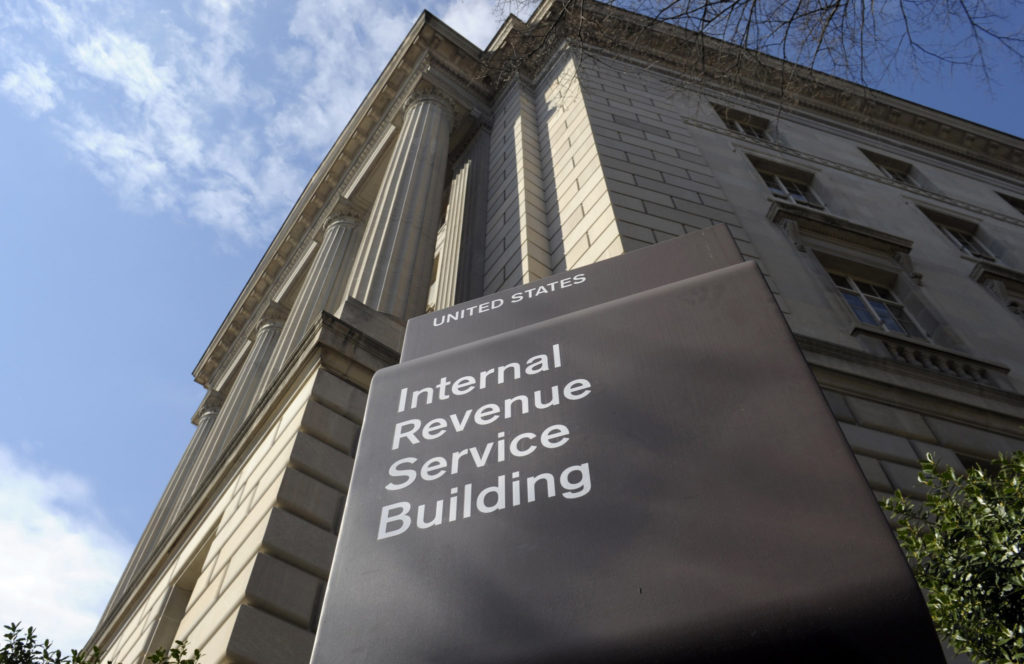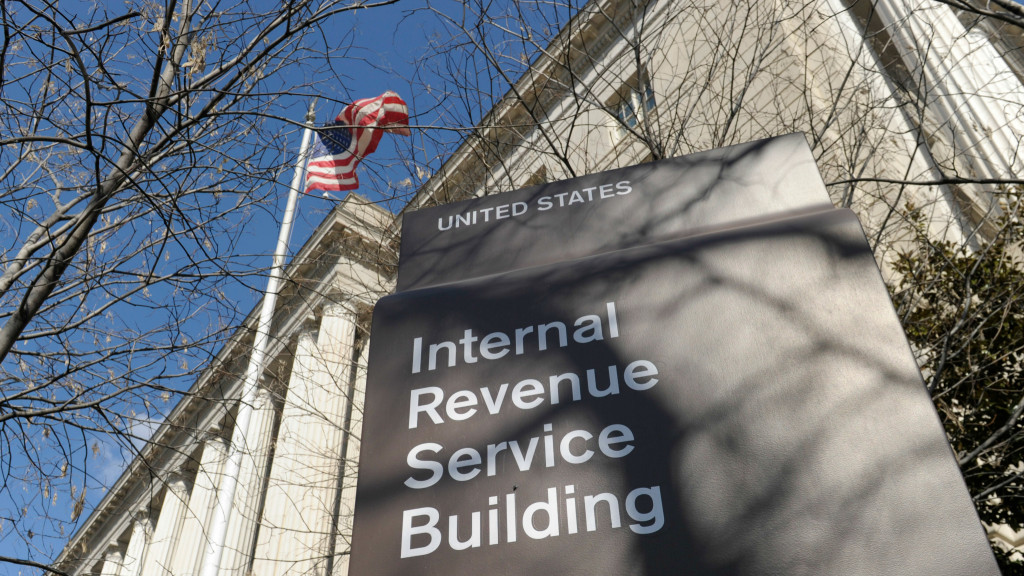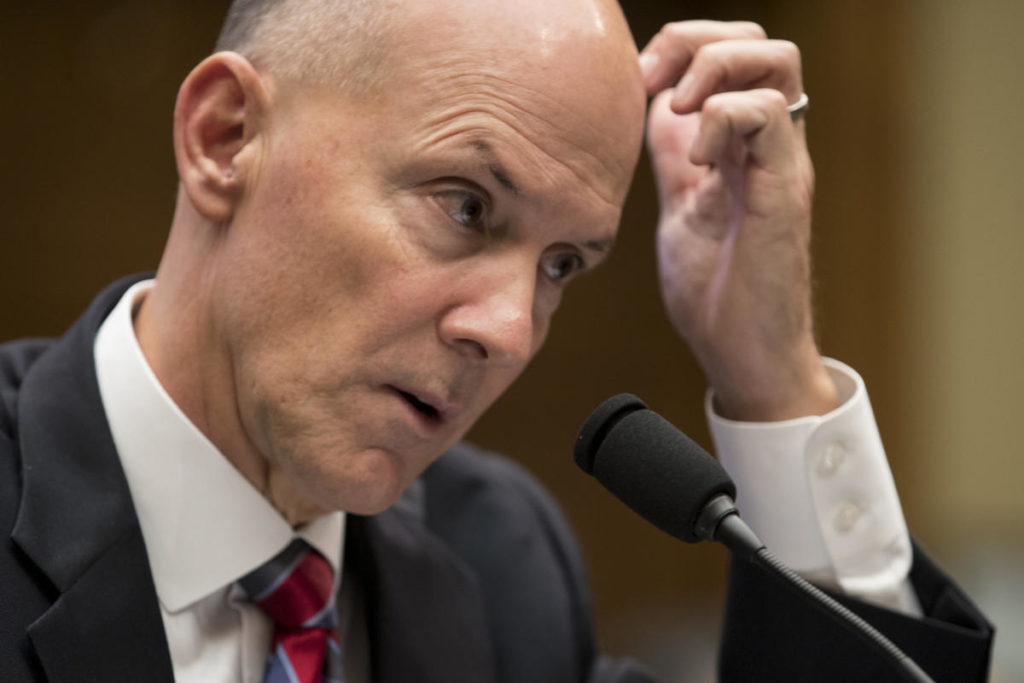Taxpayers could experience major refund delays this year from backlogged IRS

Americans around the country will begin filing their income taxes as the filing period opened this week, but many could experience major delays from the Internal Revenue Service, which still has millions of unprocessed returns from last year. The IRS warned Americans this week with an “urgent reminder” to file electronically “to help speed refunds.” The IRS cited “several critical tax law changes that took place in 2021 and ongoing challenges related to the pandemic” for the delays. Americans hoping to receive tax refunds also could see delays, especially if they do not file electronically. “None of this is new, with the IRS admitting last year that returns which previously took three weeks to process were taking up to four months,” tax expert at the American Enterprise Institute Matt Weidinger wrote. “….Record child tax credit payments are pending in the coming tax season, payable to a record number of recipients, even without the passage of further legislation.” Some have argued the IRS needs more funding to handle the returns, but others point out that the shift toward e-filing should have more than lifted the load for the federal tax-collecting agency. “In the 1980s, the IRS was processing paper returns, today 81% of returns are e-filed. With the technology and tools available today, the IRS should be far more efficient,” Heritage Foundation economic and tax experts Rachel Greszler and Preston Brashers said in a joint statement. The National Taxpayer Advocate released its federally commissioned report in mid-December, which said the IRS had 6.2 million unprocessed individual returns, 2.8 million unprocessed business returns, 2.4 million unprocessed amended individual returns, as well as 427,000 amended business returns. For those corresponding with the IRS, their messages are awaiting processing along with 4.75 million pieces of correspondence from taxpayers around the country. “The IRS is in crisis and needs to apply resources to its core mission – processing returns and paying the corresponding refunds,” the group said. Another factor for the backlogs is that Congress expanded the IRS’ power and responsibilities significantly in recent months. That expansion included a monthly child tax credit program that handed out funds to millions of American families based on income and the number of children they have. Critics say this expansion, and the ensuing backlogs, are evidence the IRS has gone beyond its bounds. “As part of the American Rescue Plan, during 2021, the IRS issued monthly checks to the families of roughly 60 million children,” Greszler and Brashers said. “More generally, Congress has continued to expand ‘refundable’ tax credits, payments from the IRS to individuals who pay no income tax. Because they offer checks in the mail, refundable tax credit programs are rife with fraud, as well as improper payments through no fault of the recipient. These programs are extremely costly to implement while ensuring checks are going out to whom they were intended. If Congress wants to eliminate backlogs going forward, it should focus on simplifying the tax code, and it should stop expanding the scope of what the IRS does.” The backlogs are fueling Congressional Republicans, who have been demanding answers from the Biden administration for months on mismanaged and wasted tax dollars. Republicans sent letters to the IRS in April and November last year, pressing these same questions. Members sent a letter again in December raising questions about the backlog. “This massive backlog is causing significant and unnecessary burdens for families and small businesses who can’t get answers from the IRS about why their returns have not been processed,” the letter said. “The IRS is in danger of falling into a vicious backlog cycle that will harm millions of taxpayers. “As the Internal Revenue Service (IRS) prepares for the 2022 tax filing season, we write with great concern regarding the backlog of unprocessed returns from the current 2021 and 2020 filing seasons,” the letter adds. By Casey Harper | The Center Square Republished with the permission of The Center Square.
Democrats eye Donald Trump’s tax returns but expect a long fight

Getting President Donald Trump‘s tax returns is high on the list of Democratic priorities now that they have won the House. By law, the leaders of tax-writing committees in the House and Senate can obtain tax returns and related information from the Internal Revenue Service. Democrats will control the House panel next year. Yet there’s no guarantee that the Trump administration will provide the president’s returns. That sets up the possibility of a legal battle over the request that could take years to resolve. Trump broke with political tradition in 2016 by refusing to release his income tax filings. He says he won’t release them because he’s under audit, and he claimed at a press conference this week that the filings are too complex for people to understand. The Democrats tried and failed several times to obtain Trump’s returns as the minority party in Congress. Now, having gained some control, they see them within their grasp. Eyes are on Rep. Richard Neal of Massachusetts, who is now the senior Democrat on the powerful Ways and Means Committee and will become its chairman in January. When asked Wednesday whether the committee under his control would ask for the documents, Neal said, “Yes, I think we will.” If the Trump administration refuses and mounts a legal challenge, Neal said, “Then I assume that there would be a court case that would go on for a period of time.” A legal fight could potentially even stretch beyond the 2020 presidential election, suggested Andy Grewal, a professor at the University of Iowa College of Law. Grewal has maintained that a request for Trump’s returns, if made for “purely political purposes,” may exceed the limits of Congress’ authority. Starting with the 2016 campaign, Trump broke with political tradition by repeatedly refusing to release his income tax filings. Those filings are deemed sacredly secret for citizens, but traditionally not for presidents. Trump has said he hasn’t released them because his taxes are under audit by the IRS — even though experts and IRS officials say such audits don’t bar taxpayers from releasing their returns. Asked about releasing his filings, Trump reaffirmed that justification during a post-election news conference Wednesday. “They’re under audit. They have been for a long time,” the president said. “They’re extremely complex. People wouldn’t understand them.” Giving a slight opening, Trump said that if the audit was completed, “I would have an open mind to it. I would say that.” But, he added, “Nobody turns over a return when it’s under audit.” In 2017, more than a million people signed a petition to the White House urging Trump to make the returns public. Questions loom: Was the swaggering longtime businessman and real estate mogul really worth $10 billion when he entered the White House, as he has claimed? Are there conflicts of interest lurking? How has his global panoply of properties and other assets been valued for taxation purposes? What are the sources of his income and to whom might he be beholden as a result? Does Trump stand to gain personally from the sweeping Republican tax law enacted late last year, which he championed, and, if so, how specifically? Among the sought-after details: Trump’s charitable giving, the type of deductions he claimed, how much he earned from his assets and what strategies he deployed to reduce his tax bill. House Democratic leader Nancy Pelosi declined during a press conference Wednesday to specifically address the question of Trump’s returns, saying only that Congress has “a constitutional responsibility to have oversight” and citing examples such as the government’s environmental policy that would be ripe for Congress to investigate. The high interest — Democrats would say the urgency — in lifting the veil on Trump’s taxes ramped up last month when The New York Times published an extensive report suggesting that the Trump family cheated the IRS for decades, undervaluing reported assets and using dubious tax maneuvers and outright fraud in some cases. A lawyer for Trump disputed the Times’ findings of possible tax fraud or evasion and said that parts of the report were “extremely inaccurate.” The newspaper said its report was based on more than 100,000 pages of financial documents, including confidential tax returns from Trump’s father and his companies. That could spur the Democrats on the Ways and Means Committee to ask for Trump’s returns going back many years. By law, the chairmen of the House panel, the Senate Finance Committee and the Joint Committee on Taxation can make a written request for any tax returns to the Treasury Secretary, who oversees the IRS. The law says the Treasury chief “shall furnish” the requested information to the members of the committee for them to examine behind closed doors. The IRS, with custody of Trump’s returns, has been headed since Oct. 1 by a commissioner who worked as a private tax attorney for nearly four decades representing individuals and companies in cases before the agency. During the 2016 campaign, the commissioner, Charles Rettig, defended Trump’s refusal to release his filings. He promised at his Senate confirmation hearing to uphold the IRS’ political independence from the White House. Treasury Secretary Steven Mnuchin “will review any request with the Treasury general counsel for legality,” the department said in a statement Thursday. Trump’s attorney Rudy Giuliani has said the Democrats could have a hard time proving their demand was intended for pursuing legitimate congressional oversight, not a political scavenger hunt. If the administration refuses to hand over the returns, the Democrat-led committee might punch back with subpoenas, move to hold officials in contempt of Congress or sue the administration. There’s no roadmap or historical precedent for the situation. Some observers anticipate that the Trump Justice Department would file a lawsuit against the House to block release of the returns. In that case, the administration might try to prove that the Democrats’ demand was politically motivated, as Giuliani indicated. The University of Iowa’s Grewal is among the experts who believe the administration may seek to make
New IRS rules may hurt Alabama’s private school scholarship program

Advocates of a state-supported private school scholarship program are concerned that donations could drop under proposed new IRS rules. The program, known as the Alabama Accountability Act, gives donors an income tax break for donations to groups that provide private school scholarships. Currently, donors get a dollar-for-dollar reduction on their state income tax bill, and can also claim a federal tax deduction. The rules proposed last week would end the ability for large donors to claim the federal tax deduction in addition to the 100 percent tax credit. Lesley Searcy of the Alabama Opportunity Scholarship Fund – which provides scholarships to 1,600 children- said many of the affected donors “are the very ones who support our students.” The program provides private school scholarships for nearly 2,000 children across the state. Republished with permission from the Associated Press.
Tea party groups get $3.5 million payout in settlement with IRS

A judge gave final approval on the settlement between the Internal Revenue Service (IRS) and hundreds of tea party groups groups across the country. The decision closes the class action suit, which lasted more than five years, that alleged the IRS illegally targeted the conservative groups when applying for tax-exempt status during the 2012 election. The IRS agreed to pay $3.5 million to the disgruntled, targeted groups. “It shows that when a government agency desires to target citizens based on their viewpoints, a price will be paid,” said Edward Greim, a lawyer who led the class-action case in federal court in Cincinnati, according to the Washington Times. Judge Michael R. Barrett deemed the settlement “fair, reasonable and adequate.” History of IRS targeting tea party groups Republicans were outraged in 2013 when the IRS admitted the targeting, in part by zeroing in on groups with words such as “tea party” or “patriot” in their names. Many had their applications delayed for months and years. Some were asked improper questions about their donors and even their religious practices, an inspector general’s report found. The Obama Justice Department announced in 2015 that no one at the IRS would be prosecuted. It said investigators found mismanagement but no evidence that the tax agency had targeted a political group based on its viewpoints or obstructed justice.
Terri Sewell proposal passes in IRS reform package

The House voted Wednesday to pass the Taxpayer First Act, bipartisan legislation aimed at transforming taxpayer interactions with the IRS for the first time since 1998 by strengthening the transparency and accountability at the Internal Revenue Service (IRS) and improving taxpayer services. H.R. 5444 passed the House 414-0 with the full support of the Alabama delegation. Among the bill’s many components was a provision proposed by Alabama 7th District U.S. Rep. Terri Sewell and her colleague Missouri-Republican Rep. Jason Smith. Originally introduced as the Preserving Taxpayers’ Rights Act, the provision aims to streamline and improve IRS audit processes and restore a more collaborative approach to resolution of disputes between taxpayers and the agency. “This legislation is a chance for us to strengthen the relationship many taxpayers have with the IRS. Tax season is a stressful time for millions of Americans, and the compliance burden on the average American and small business owner is unnecessarily difficult,” Sewell explained. “Today, Congress took important steps to make the tax filing experience more sensible, fairer, and more efficient.” Sewell continued, “The bill we passed today includes a bipartisan provision which I drafted with Rep. Jason Smith that improves efficiency and customer service at the IRS and gives taxpayers a chance to resolve disputes with the IRS without being forced to litigate in court. While our fight for a friendlier, more efficient tax system is not over, today’s vote is a victory for all taxpayers.” The Preserving Taxpayers’ Rights Act, which was included in the underlying legislation that passed the House today, contains provisions which: maintains taxpayers’ legal right to have cases heard by the IRS Office of Appeals; further defines which IRS cases can be designated for litigation; further defines when tax liability assessments can be levied; and eliminates the use of outside law firms for federal tax audits.
Daniel Sutter: Lessons from Tax Day

Income taxes were just due, and I hope that filing this year wasn’t too painful. Despite the Internal Revenue Service’s (IRS) fearsome reputation, our tax system relies extensively on voluntary compliance. Tax Day thus reminds us why it is important for Americans to believe that our government serves our interests, an impression which seems endangered today. It may seem odd to think that we voluntarily pay taxes. Few Americans fill out tax forms for fun, and many pay professionals to avoid the stress. We file because the IRS makes us, right? Well, yes and no. Filing a tax return is legally required, which is the yes part. But what are the consequences of filing a less than truthful return? An IRS audit could reveal your tax evasion or underpayment of taxes. But the likelihood of an audit is less than you probably think: half of one percent of individual income tax returns annually. Audit rates differ based on a taxpayer’s reported amount and nature of income. The IRS examines (their euphemism for audit) only one in five hundred taxpayers making less than $200,000 with no business income. More than just our individual income tax system relies on voluntary compliance. About one percent of corporate income tax returns are audited, and the sales tax relies on retailers accurately reporting sales. Environmental, workplace safety, and other government regulations depend on accurate reporting of information by businesses. Voluntarily paying taxes improves our standard of living. The cost of auditing even a quarter of tax returns would be staggering: a huge increase in IRS agents, and enormous monetary, time, and emotional costs for taxpayers. Social science research suggests that treating people like lawbreakers can undermine respect for the law. If so, then having the IRS audit more taxpayers might conceivably increase tax avoidance, especially if some ways to hide or shelter income always exist. We pay taxes voluntarily because they fund activities we want government to perform. The American Revolution established that in America, government would serve citizens. By contrast, throughout most of human history, people served kings or emperors. Libertarians like to say that taxes are theft, and this contains a kernel of truth. Ultimately armed federal agents will seize property for unpaid taxes; armed robbers similarly take property, and injure owners if they resist. Taxes are not theft because, and only because, we approve of what government does with our money. Not each and every dollar spent, obviously, but the package as a whole. Many Americans express a willingness to pay taxes. In 2017, 88 percent of Comprehensive Taxpayer Attitude Survey respondents agreed that cheating on taxes was not acceptable, while 95 percent agreed that paying taxes is a civic duty. Americans seemingly accept that taxes are the price we pay for civilization. Today perhaps more than ever, however, Americans seem to view government as out of control. President Trump’s campaign promise to “Drain the Swamp” seemed to resonate with millions of Americans. (Whether the President is engaged in swamp draining is a different question.) Many young Bernie Sanders voters also seemed alienated from mainstream politicians. Such attitudes bode ill for a system based on voluntary compliance. To be fair, perceptions of a disconnect with government are hardly new. Thomas Jefferson viewed his election victory over John Adams in 1800 as a second American revolution, which implies that President Adams was emulating Britain’s King George III. The student protests and urban riots of the 1960s left some political scientists wondering if America was ungovernable. Ronald Reagan claimed that Washington was the problem, not the solution. Conservatives’ concern today about a liberal deep state conspiracy against President Trump may just be old wine in new bottles. Taxes are not theft because we believe that government ultimately serves us. Tax Day reminds us that if Americans stop believing that government reflects our values and interests, our tax system will no longer function as it has. And the resulting changes will almost certainly be for the worse. ••• Daniel Sutter is the Charles G. Koch Professor of Economics with the Manuel H. Johnson Center for Political Economy at Troy University and host of Econversations on TrojanVision. The opinions expressed in this column are the author’s and do not necessarily reflect the views of Troy University.
Hurricane victims may qualify for earned income tax credit

The IRS is encouraging those who were effected by last year’s hurricanes; specifically hurricanes Irma, Harvey, and Maria, to see if they meet the requirements for the Earned Income Tax Credit (EITC). A special calculation, available only to those who resided in one of the hurricane disaster areas during 2017, may allow them to claim the EITC or claim a larger than usual credit. Using this calculation, taxpayers whose incomes dropped in 2017 can choose to use the credit utilizing their 2016 earned income instead of their 2017 earned income. Qualified taxpayers should calculate the credit in both ways; using 2017 earned income and using their 2016 earned income in order to estimate which method will yield the larger EITC. Eligible taxpayer’s should meet the basic requirements and have earned income from working for someone or being self-employed to qualify for EITC. Methods of earning an income include: owning a business or a farm, home-based businesses, and or employment in the service, construction and agriculture industries. Certain disability payments may also qualify as earned income for EITC purposes. The EITC assists working people who don’t earn a high income and meet other qualifications and because it’s a refundable credit, those who claim it may pay less federal tax, pay no tax or even get a refund up to a $6,318. On average, EITC adds almost $2,500 to refunds. However, exact credit amounts vary based on family size and income. Taxpayers without an authorized child who have incomes below $20,600 may also be eligible for a smaller credit of up to $510. Friday, Jan. 26 the IRS and national partners will hold the annual EITC Awareness Day to alert millions of taxpayers who may be missing out on this and other refundable credits. One easy way to support this outreach effort is by participating in the IRS Thunderclap to help promote EITC Awareness Day.
Tea party groups settle lawsuits over IRS mistreatment

The Trump administration has agreed to what a lawyer described as a “very substantial” payout to hundreds of tea party groups to settle a class-action lawsuit over the extra, often burdensome IRS scrutiny they received when applying for tax-exempt status during the 2012 election. The settlement would end a chapter in a political scandal that dogged the Obama administration and continues to irk Republicans. In settling the case, the Trump administration is agreeing to government payments to groups that share its political beliefs. The conservative, anti-establishment tea party movement was something of a precursor to Donald Trump‘s populist, America-first presidential campaign. Announced Thursday, the settlement still needs a judge’s approval. Eddie Greim, a lawyer representing more than 400 groups in a class-action suit, described the financial settlement as generous but would not elaborate because details remained sealed Thursday. The Justice Department made no reference to a payout in its announcement. The department said it is settling a second lawsuit with an apology from the IRS for the intensive scrutiny of the groups, which argued their constitutional rights were violated when they were singled out based on their political views. Republicans were outraged in 2013 when the IRS admitted the targeting, in part by zeroing in on groups with words such as “tea party” or “patriot” in their names. Many had their applications delayed for months and years. Some were asked improper questions about their donors and even their religious practices, an inspector general’s report found. The Obama Justice Department announced in 2015 that no one at the IRS would be prosecuted. It said investigators found mismanagement but no evidence that the tax agency had targeted a political group based on its viewpoints or obstructed justice. Republicans were disappointed again when the Trump Justice Department, under Attorney General Jeff Sessions, said it would not reopen its case against Lois Lerner, who had led the IRS office that processes applications for tax exempt status. Still, Sessions condemned the misconduct in a statement announcing the settlements. “There is no excuse for this conduct,” Sessions said. “Hundreds of organizations were affected by these actions, and they deserve an apology from the IRS. The groups that sued were “very pleased” with the settlement outcome, Greim said. “It’s a great day for the First Amendment and the promise of a fair and impartial government,” he said in a statement. “But this day was too long in coming.” Much of the agency’s leadership, including Lerner, resigned or retired over the scandal. One of the proposed agreements calls senior management “delinquent” in providing control and direction over the process. It faults Lerner for failing to tell upper-level management of the long delays in processing applications from tea party and other conservative groups. “These cases against the IRS shouldn’t have happened in the first place,” Sessions said during a speech at the Heritage Foundation. “They never would have been necessary if government had acted properly.” Republished with permission from the Associated Press.
Senators bewildered by Equifax contract with IRS after hack

Senators are expressing bewilderment that credit reporting company Equifax has received a $7.25 million contract with the IRS to provide taxpayer and personal identity verification services. A Senate committee is examining the data breach at Equifax that’s affected more than 145 million people. Republican Sen. Ben Sasse (sas) of Nebraska has this question for the company’s former CEO: “Why in the world should you get a no-bid contract right now?” Richard Smith says he doesn’t know whether it was a no-bid contract, but says it’s his understanding the contract was something Equifax has had in the past and “I think it’s being renewed.” The contract says Equifax was the only company capable of providing the services, and it was deemed a “critical” service that couldn’t lapse. Republished with permission from the Associated Press.
Donald Trump filed for an extension on his 2016 tax return

President Donald Trump filed for an extension on his 2016 tax return, the White House said Saturday. Press secretary Sean Spicer did not provide information on when Trump sought the extension or why. Tax Day this year was on April 18. The Internal Revenue Service allows individuals and businesses to apply for a six-month extension to get more time to file a return. An extension does not provide more time to pay taxes. As a candidate and as president, Trump has refused to release his tax returns, breaking a decades-long tradition. He has said he would release them when the Internal Revenue Service completes an audit – though experts and IRS officials said such audits don’t bar taxpayers from releasing their returns. The few Trump tax returns the public has seen weren’t released by him, but disclosed by news outlets. Two leaked pages of his 2005 return that came out in March didn’t include full details on income and deductions, but did show that he would have benefited massively by an elimination of the alternative minimum tax – a feature of his just-outlined tax plan. And three pages that surfaced last year showed he had claimed a $916 million loss on his 1995 return, which could be used to reduce his taxes by offsetting later gains. Republished with permission of The Associated Press.
Donald Trump blasts release of 2005 tax form, reporter’s account

President Donald Trump earned $153 million and paid $36.5 million in income taxes in 2005, paying a roughly 25 percent effective tax rate thanks to a tax he has since sought to eliminate, according to newly disclosed tax documents. The pages from Trump’s federal tax return show the real estate mogul also reported a business loss of $103 million that year, although the documents don’t provide detail. The forms show that Trump paid an effective tax rate of 24.5 percent, a figure well above the roughly 10 percent the average American taxpayer forks over each year, but below the 27.4 percent that taxpayers earning 1 million dollars a year average were paying at the time, according to data from the Congressional Joint Committee on Taxation. The tax form was obtained by Pulitzer prize-winning journalist David Cay Johnston, who runs the website DCReport.org, and reported on MSNBC’s “The Rachel Maddow Show.” Johnston, who has long reported on tax issues, said he received the documents in the mail, unsolicited. Trump took to Twitter early Wednesday to cast doubt on Johnston’s account. “Does anybody really believe that a reporter, who nobody ever heard of, ‘went to his mailbox’ and found my tax returns? @NBCNews FAKE NEWS!” Johnston, speaking to ABC’s “Good Morning America” Wednesday, said it’s entirely possible that he received the returns from Trump himself or someone close to him, saying, “Donald has a long history of leaking things about himself.” He noted that the real question remains the sources of Trump’s income, saying Trump doesn’t want us to know “who he’s beholden to.” Trump’s hefty business loss appears to be a continued benefit from his use of a tax loophole in the 1990s, which allowed him to deduct previous losses in future years. In 1995, Trump reported a loss of more than $900 million, largely as a result of financial turmoil at his casinos. Tax records obtained by The New York Times last year showed the losses were so large they could have allowed Trump to avoid paying taxes for up to 18 years. But Trump’s 2005 filing shows that another tax prevented him from realizing the full benefit of those deductions. The bulk of Trump’s tax bill that year was due to the Alternative Minimum Tax, a tax aimed at preventing high-income earners from paying minimal taxes. The AMT requires many taxpayers to calculate their taxes twice — once under the rules for regular income tax and then again under AMT — and then pay the higher amount. Critics say the tax has ensnared more middle-class people than intended, raising what they owe the federal government each year. Were it not for the AMT, Trump would have avoided all but a few million dollars of his 2005 tax bill. Trump’s campaign website called for the end of the AMT, which is expected to bring in more than $350 billion in revenues from 2016 to 2025. As a candidate and as president, Trump has refused to release his tax returns, breaking a decades-long tradition. Although he initially promised to do so, he later claimed he was under audit by the Internal Revenue Service and said his attorneys had advised against it — though experts and IRS officials said such audits don’t bar taxpayers from releasing their returns. The White House pushed back even before the release of the documents Tuesday night, saying that publishing the information was illegal. “You know you are desperate for ratings when you are willing to violate the law to push a story about two pages of tax returns from over a decade ago,” the White House said in a statement issued on condition that it be attributed to an anonymous official, although the president has decried the use of anonymous sources. The unauthorized release or publishing of federal tax returns is a criminal offense, punishable by a fine of up to $5,000 and up to five years in jail. But Maddow argued that MSNBC was exercising its First Amendment right to publish information in the public interest. Trump long insisted the American public wasn’t interested in his returns and said little could be learned from them. But Trump’s full returns would contain key details about things like his charitable giving, his income sources, the type of deductions he claimed, how much he earned from his assets and what strategies Trump used to reduce his tax bill. The issue was a major point of attack from his election rival Hillary Clinton, who suggested Trump had something to hide. The White House has not said whether the president plans to release his returns while he’s in office. More than 1 million people have signed a White House petition urging the president to release them. Republished with permission of The Associated Press
IRS strikes back as agents make big dent in identity theft

The IRS strikes back: The tax agency reports that the number of identity theft victims plummeted last year after agents struggled for years to combat what has become a multibillion-dollar industry. The number of victims dropped by 46 percent, to 376,000, the IRS said. These taxpayers had their identities stolen by criminals who used their Social Security numbers and birthdates to obtain fraudulent tax refunds. The IRS stopped nearly 1 million fraudulent refunds from being issued last year. They totaled almost $6.6 billion, the agency said. “It’s a much more challenging time for the cybercrooks,” said Mark Ciaramitaro, vice president for retail tax products and services at H&R Block. “All of the easy paths have been closed.” Identity theft exploded from 2010 to 2012, and “for a time overwhelmed law enforcement and the IRS,” said John Dalrymple, deputy IRS commissioner for services and enforcement. At the IRS, it peaked in 2014, when the agency identified more than 766,000 victims. That same year, the IRS blocked 1.8 million in fraudulent refunds from being issued. They totaled $10.8 billion. “We’ve driven a lot of the fraud out of the system,” Dalrymple said. The IRS is a popular target for sophisticated identity thieves because the agency issues more than $300 billion in tax refunds each year. Several years ago, it was as simple as using another person’s Social Security number and birthdate to fill out a fake tax return claiming a big refund. If thieves filed the return early in the tax filing season — before the legitimate taxpayer — they could get refunds before the IRS received verifying financial information from employers, banks and brokers. To make it easier, thieves can get fraudulent refunds on prepaid debit cards that are not linked to bank accounts. “I think everybody got caught by surprise by how inventive the criminals were here,” Dalrymple said. “I don’t think it was just the IRS. I think in general, the whole idea of identity theft caught everybody by surprise.” Criminals can steal victims’ personal information from hospitals, doctor’s offices, universities, prisons — any entity that collects Social Security numbers and birthdates. In 2015, federal authorities broke up a massive identity theft ring in Alabama and Georgia that netted $10 million in fraudulent refunds. Among the victims: Soldiers injured in Afghanistan who were being treated at Fort Benning’s hospital. Last year, authorities broke up a ring in the District of Columbia that tried to obtain more than $20 million in fraudulent tax refunds. Among the victims: people in assisted living facilities, drug addicts and prison inmates. In recent years, the IRS has beefed up its computer filters to identity potential fake tax returns. If there are dramatic differences in a taxpayer’s return from year to year, it might get flagged for additional review. Two years ago, the IRS also teamed up with major tax preparers and state tax agencies to share information and improve security. Identity theft is “the No. 1 issue that the IRS talks to us about,” said Brian Ashcraft, director of tax compliance at Liberty Tax. “It’s been a huge focus.” Online tax preparers are working to better confirm the identity of their customers through stronger passwords and by using more than one way to verify them, said Julie Miller of Intuit Inc., which owns Turbo Tax. For example, after online customers enter a password, they might receive a text from the company with an additional code to enter. Congress has also given the IRS more tools to prevent criminals from getting fraudulent tax refunds. This year, employers are required to report wage information to the IRS by Jan. 31. In the past, most employers had until the end of March to report wage information, often long after refunds had been issued. Also, the IRS is now required to hold refunds until Feb. 15 for families claiming the earned income tax credit or the additional child tax credit. These credits are available in the form of payments to people who don’t make enough money to owe any federal income taxes, which makes them attractive to identity thieves. The provision, however, delays tax refunds for millions of low-income families. Tax preparers and the IRS said identity theft is still a major threat as criminals become more sophisticated. To combat it, they regularly share information about new threats and scams, especially during tax season. “This is not a time to celebrate,” said Ciaramitaro of H&R Block. “It’s not fixed but I think that cooperation has led to measurable improvement.” Graphic shows figures for tax identity theft since 2013; 2c x 3 inches; 96.3 mm x 76 mm Republished with permission of The Associated Press.


